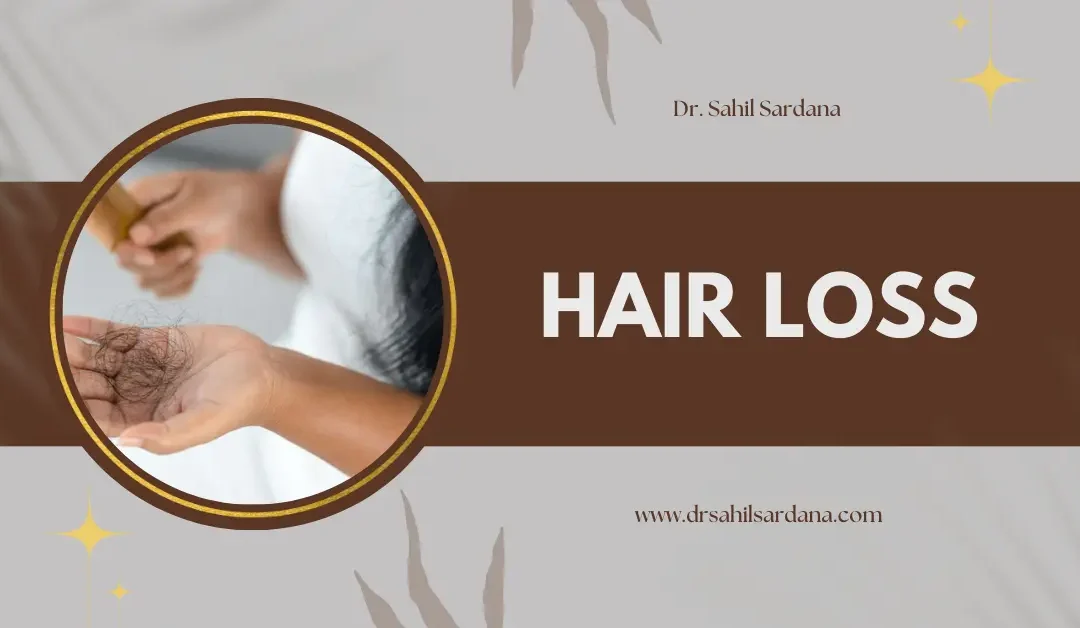Hair loss is a commonplace difficulty that affects people of every age and gender. While it is irritating and even emotional, information about the reasons, symptoms, and answers could make coping with it lots less difficult. Suppose you’re searching for a satisfactory hair transplant in Hisar. In that case, this guide will offer all of the facts you need, which includes details about prevention, remedies, and Dr Sahil Sardana, one of Hisar’s top hair transplant professionals.
What is Hair Loss?
Hair loss, also known as alopecia, refers to the thinning or whole lack of hair at the scalp or different body elements. While losing some hair every day is every day, excessive hair fall can be a sign of an underlying issue that needs attention.
Symptoms of Hair Loss:
- Gradual Thinning: Hair turns thinner through the years, mainly on the top of the head.
- Receding Hairline: A “M”-formed hairline is regularly visible in men.
- Bald Spots: Circular or patchy bald spots that can seem at the scalp or beard.
- Sudden Hair Fall: Hair falls out in clumps, often due to pressure or infection.
- Full-Body Hair Loss: This is rare and regularly linked to clinical treatments like chemotherapy.
- Scalp Issues: Itching or scaling at the scalp may additionally accompany hair loss.
Types of Hair Loss:
There are several varieties of hair loss, every with its personal characteristics and reasons. Understanding those will let you discover the fine treatment.
- Androgenetic Alopecia (Pattern Hair Loss): The most commonplace form of hair loss, due to genetics and hormones. It includes male-pattern baldness and female-sample thinning.
- Telogen Effluvium: Temporary hair loss caused using pressure, illness, or hormonal adjustments. Hair falls out in clumps but typically regrows.
- Alopecia Areata: An autoimmune condition causing patchy hair loss.
- Traction Alopecia: Hair loss as a result of tight hairstyles that pull at the scalp.
- Anagen Effluvium: Rapid hair loss due to clinical treatments like chemotherapy.
- Scarring Alopecia: Hair loss as a result of conditions that scar the scalp, preventing regrowth.
Most Common Type of Hair Loss:
The maximum commonplace sort of hair loss is Androgenetic Alopecia or sample hair loss. It affects a full-size percentage of both men and women and tends to develop progressively over the years if untreated.
Causes of Hair Loss:
Several elements can contribute to hair loss. Here are the maximum common ones:
- Genetics: Family records perform a vast function in male or female pattern baldness.
- Hormonal Changes: Pregnancy, menopause, or thyroid troubles can cause hair loss.
- Stress and Illness: Emotional strain or diseases like alopecia areata.
- Poor Diet: Lack of vital vitamins like protein, iron, and nutrients.
- Hair Products and Styling: Frequent use of harsh chemical substances or tight hairstyles.
- Medical Conditions: Scalp infections or autoimmune diseases.
Complications of Hair Loss:
Hair loss may have several complications, including:
- Emotional Distress: Hair loss can affect self-esteem, leading to anxiety, melancholy, and social withdrawal.
- Scalp Sensitivity: Hair loss might also make the scalp greater sensitive to sunburn, cold, or minor accidents.
- Infections: Conditions like traction alopecia or scarring alopecia can result in scalp infections.
- Limited Hairstyling Options: Hair thinning or bald spots can restrict styling alternatives.
- Progressive Loss: Without the right remedy, hair loss can also get worse over the years, making interventions more difficult.
- Impact on Professional and Personal Life: In a few cases, hair loss can result in a lack of self-belief in social or professional settings.
Diagnosis and Tests:
To find the purpose of hair loss, your health practitioner can also suggest:
- Physical Exam: Checking your scalp and hair.
- Blood Tests: To become aware of any underlying scientific conditions.
- Pull Test: Gently pulling hair to peer how a good deal comes out.
- Scalp Biopsy: Taking a small sample of pores and skin from the scalp.
Management and Treatment:
Managing hair loss involves a mixture of medical treatments, way of life changes, and in a few instances, hair restoration methods. Here are the alternatives:
Medical Treatments:
- Minoxidil (Rogaine): A topical strategy to sell hair boom.
- Finasteride (Propecia): A prescription medicine for men.
Prevention Tips:
- Eat a Healthy Diet: Include protein, iron, and vitamins like biotin.
- Avoid Heat and Chemicals: Limit the usage of straighteners, curling irons, and hair dyes.
- Be Gentle: Use a huge-tooth comb and avoid pulling your hair.
- Manage Stress: Practice yoga or meditation to reduce stress.
- Regular Check-Ups: Visit a dermatologist for early symptoms of hair problems.
Hair Transplant:
For superior instances of hair loss, a hair transplant is frequently the handiest answer. In this technique, hair is moved from one part of the scalp to another.
Best Hair Transplant in Hisar:
Dr. Sahil Sardana is a main expert in Hisar, offering superior hair transplant procedures with terrific consequences. With his information, you can regain your self-assurance and obtain natural-looking hair.
Conclusion:
Hair loss can be difficult, however with the proper expertise and aid, it’s potential. Whether you need lifestyle modifications or an expert treatment like the excellent hair transplant in Hisar, Dr. Sahil Sardana can manual you on the course to healthier hair. Don’t let hair loss keep you again—take action these days and repair your self-assurance!
FAQ’s:
Q1. Can hair loss be reversed?
Ans. Yes, sure styles of hair loss, consisting of telogen effluvium or hair loss caused by dietary deficiencies, can often be reversed with the right remedy and way-of-life adjustments. However, conditions like androgenetic alopecia can also require scientific intervention or hair transplant for substantial improvement.
Q2. At what age does hair loss usually begin?
Ans. Hair loss can start as early as the past due teens or early twenties in a few individuals, in particular those with a circle of relatives history of androgenetic alopecia. For others, it can arise later in existence.
Q3. Is a hair transplant permanent?
Ans. Yes, hair transplants offer everlasting outcomes because the transplanted hair is typically taken from regions resistant to hair loss. However, retaining the surrounding hair may require ongoing care.
Q4. What lifestyle adjustments can save you hair loss?
Ans. Eating a balanced food regimen, handling stress, heading off harsh chemicals, and protecting your hair from warmth can help prevent or reduce hair loss.
Q5. How much does a hair transplant cost in Hisar?
Ans. The price of a hair transplant varies depending on the volume of hair loss and the approach used. Consult Dr Sahil Sardana for personalised advice and pricing.
Q6. Are there any risks with hair transplants?
Ans. Hair transplants are generally secure when executed by employing an experienced doctor. Potential risks encompass contamination, scarring, or minor discomfort, which may be controlled with the right care.

